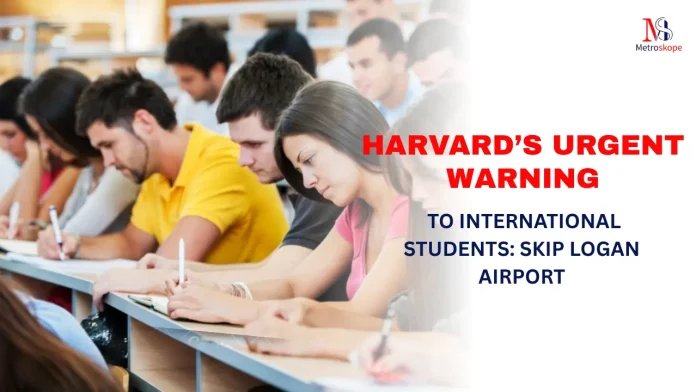Imagine landing in the U.S. as an international student, your dreams of studying at Harvard University within reach, only to face intense questioning at Boston’s Logan International Airport.
On July 3, 2025, Harvard issued a startling advisory, urging its international students, particularly those from Iran and China, to avoid Logan due to heightened scrutiny by U.S. immigration officials.
Instead, the university recommends flying into alternative airports like New York’s JFK. This warning, delivered during a private briefing, has sent shockwaves through the global student community, especially in India, where thousands aspire to U.S. education.
Why is Logan a risk, and what does this mean for students in 2025? Let’s dive into Harvard’s advisory, the reasons behind it, and its impact on the pursuit of academic dreams.
Harvard’s Advisory: Avoid Logan, Choose JFK
On July 3, 2025, Harvard University’s International Office, in collaboration with legal experts from Harvard Law School, held a private briefing for international students.
The university advised students, especially those from Iran and China, to avoid entering the U.S. through Boston’s Logan International Airport due to increased scrutiny by U.S. Customs and Border Protection (CBP) officials.
The Times of India reported that Harvard recommended alternative entry points, such as New York’s John F. Kennedy International Airport (JFK) or other major hubs, to minimize the risk of delays, interrogations, or denials of entry.
Students were also cautioned to be mindful of their social media activity and the content on their electronic devices, as these are increasingly scrutinized during immigration checks.
The advisory highlighted specific concerns for students from certain countries, particularly Iranians, who have faced disproportionate questioning at Logan.
Bloomberg noted that Harvard’s staff emphasized caution regarding social media posts, especially those deemed pro-Palestinian, anti-Semitic, or derogatory toward the U.S., which could trigger “red flags” during CBP screenings.
It remains unclear whether these assessments are conducted by human officers or artificial intelligence, adding to the uncertainty.
The briefing underscored the need for students to prepare for potential device searches and to avoid private or newly created social media accounts, which could be seen as suspicious.
Context: Heightened U.S. Immigration Scrutiny
The advisory comes amid tightened U.S. immigration policies under the Trump administration, which has intensified scrutiny of international students.
Since May 2025, the U.S. student visa appointment system has been stalled, leaving hundreds of students, particularly from Gujarat, India, without interview dates.
The Trump administration has also targeted elite universities like Harvard, accusing them of being “too liberal” and failing to address issues like antisemitism, leading to legal battles over international student enrollment.
In April 2025, Homeland Security Secretary Kristi Noem demanded that Harvard turn over records related to “dangerous or illegal activity” by foreign students, who make up about 25% of the university’s enrollment (approximately 7,000 students).
A federal judge, Allison Burroughs, blocked these efforts, calling them “misplaced” and a threat to academic freedom. Despite these legal victories, Harvard faces ongoing pressure, including a proposed $53 billion endowment tax and federal funding cuts.
The administration’s appeal of court rulings, citing national security concerns over foreign donations, has heightened tensions, making airports like Logan focal points for stringent immigration checks.
Impact on International Students
The advisory has profound implications for international students, particularly the 250,000+ Indian students in the U.S., the largest group of international scholars.
The BBC noted that Indians fill critical skills gaps in fields like technology and engineering, but visa uncertainties and airport scrutiny are forcing many to reconsider U.S. study plans. Students from Gujarat, a major hub for U.S.-bound students, face added stress, with immigration consultants reporting fears of visa rejections due to “radical” social media content or private profiles.
Ajay Singh of SIEC Education told The Times of India, “Delays like this mean gaps in education, extended academic timelines, and added expenses. Universities have been flexible, but the bottleneck is at the visa end.”
For students from Iran and China, the stakes are higher. The Straits Times reported that Iranians face particular scrutiny at Logan, prompting Harvard’s specific warning.
The advisory also affects students’ travel planning, as alternative airports like JFK may require additional domestic flights or complex itineraries, increasing costs and logistical challenges.

Harvard’s caution about social media adds another layer of stress, as students must now self-censor or risk being flagged for innocuous posts.
Public and Social Media Sentiment: Anxiety and Frustration
The advisory sparked heated discussions on X, with users expressing anxiety, frustration, and support for Harvard’s proactive stance. @EconomicTimes tweeted on July 4, 2025, “Harvard warns international students to avoid Boston Logan, use these airports instead,” amplifying the news.
@plus_right echoed the sentiment, urging tighter screenings at JFK, O’Hare, and LAX, reflecting a polarized view on immigration policies. Students and advocates voiced concerns, with posts like, “This is scary for Indian students. Why target us at Logan?”
(@StudyAbroadIN), while others praised Harvard’s guidance: “Smart move by Harvard to protect students!” (@EduGlobal).
Here’s a snapshot of X sentiment:
| Sentiment | Percentage | Example Comment |
|---|---|---|
| Concerned/Anxious | 50% | “Logan scrutiny is unfair. Indian students suffer!” |
| Supportive/Neutral | 30% | “Harvard’s advisory is a lifesaver for students.” |
| Critical/Skeptical | 20% | “Why only Logan? Sounds like overblown fear.” |
Are U.S. airport scrutiny policies fair for international students?
- A) No, they unfairly target students from specific countries.
- B) Yes, national security comes first.
- C) Neutral—needs more transparency.
Share your vote in the comments to join the conversation!
Quick Summary
On July 3, 2025, Harvard University advised international students, especially from Iran and China, to avoid Boston’s Logan Airport due to heightened immigration scrutiny, recommending alternatives like New York’s JFK.
The advisory, delivered in a briefing with legal experts, urged caution on social media and device content. The move comes amid Trump administration policies targeting Harvard, including visa freezes and legal battles over foreign student enrollment.
Indian students, the largest international group, face visa delays and added stress. X users are 50% concerned, 30% supportive, and 20% skeptical of the advisory’s necessity.
Broader Implications: A Threat to Global Education
Harvard’s advisory highlights broader challenges in international education:
- U.S.-India Student Mobility: With over 250,000 Indian students in the U.S., visa delays and airport scrutiny could deter future applicants, impacting universities’ diversity and revenue.
- Academic Freedom: Harvard’s legal victories against Trump’s policies, including Judge Burroughs’ rulings, underscore the fight to protect international student programs.
- Global Partnerships: Harvard’s contingency plans, like its cross-border program with the University of Toronto, signal a shift toward international collaboration to bypass U.S. restrictions.
The advisory also reflects a chilling effect on academic freedom, as students self-censor to avoid immigration issues, potentially stifling free expression.
The New York Times noted Harvard’s negotiations with the Trump administration for a potential settlement, suggesting a delicate balance between compliance and resistance.
Challenges and Outlook
Key challenges include:
- Visa Bottlenecks: The stalled visa system since May 2025 continues to disrupt students’ plans, with no clear resolution.
- Social Media Scrutiny: Unclear “red flags” (e.g., pro-Palestinian posts) create confusion and fear among students.
- Logistical Costs: Rerouting to airports like JFK adds travel expenses and complexity.
- Policy Uncertainty: Ongoing legal clashes between Harvard and the Trump administration could lead to further restrictions.
Looking ahead, Harvard is exploring remote learning and partnerships with global institutions to safeguard students.
If visa policies don’t ease, universities may see a decline in international enrollment, pushing students toward countries like Canada or Australia, as noted by the BBC.
Navigating a New Era for Global Students
Harvard’s bold advisory to avoid Logan Airport underscores the growing challenges for international students in a climate of heightened U.S. immigration scrutiny.
For Indian students and others, the dream of studying at elite institutions now comes with logistical hurdles and fears of unfair targeting. Yet, Harvard’s proactive guidance and legal resistance highlight the fight to preserve academic freedom.
As students navigate alternative airports and censor their digital lives, this moment calls for transparency and fairness in immigration policies.
Will the U.S. remain a beacon for global talent, or will these barriers reshape international education? The journey ahead is uncertain, but the stakes are clear.

